 (3.33 avg; 12 ratings) rate it
(3.33 avg; 12 ratings) rate it
 (3.71 avg; 12 ratings) rate it
(3.71 avg; 12 ratings) rate it
 (3.64 avg; 18 ratings) rate it
(3.64 avg; 18 ratings) rate it
 (2.78 avg; 60 ratings) rate it
(2.78 avg; 60 ratings) rate it
 (3.55 avg; 22 ratings) rate it
(3.55 avg; 22 ratings) rate it
Peter Gordon’s Fireball Crossword, “Themeless 100” – Jenni’s writeup
This week we have a smooth themeless. Well, sort of kind of. Let’s see.
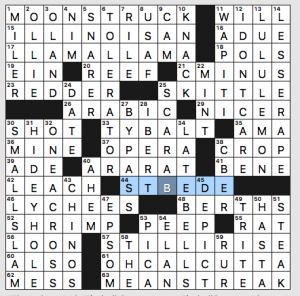
FB 10/5, solution grid
- 1a [Film that lost out to “The Last Emperor” for Best Picture] is MOONSTRUCK.
- 32d [Locale for half of a mini-theme, sometimes] is ONE ACROSS. Is Peter trying to tell us something?
- 63a [Cruel character trait] is MEAN STREAK. So yes, I think he was.
The NW stack under MOONSTRUCK is ILLINOISAN, referencing Michelle Obama, and LLAMA LLAMA, apparently the title character in a series of children’s books that were not around when my kid was little. Nice combo, somewhat dampened by 6d [Person not apt to discriminate], which is apparently TOLERATOR. I’m not crazy about the word itself; never used it and don’t remember ever seeing it. In addition, if we are being gracious and “tolerating” others, we are reinforcing the idea that we are mainstream and they are “other,” so we are indeed apt to discriminate, at least subconsciously. My anti-racism work is not aimed at a tolerant society but at an inclusive, welcoming, and celebratory society.
A few other things:
- 12d [Apathetic comment] is I DON’T CARE, which always makes me think of Maurice Sendak’s Pierre, who is more hostile than apathetic.
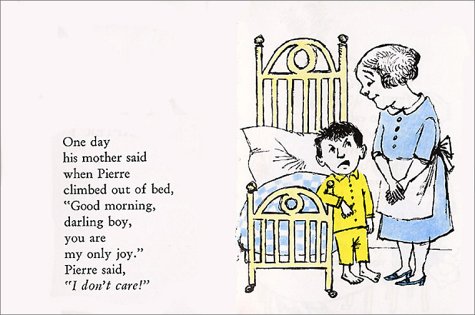
- There’s a nice vertical stack in the SW corner, with SMALL SLAM and HIDEY HOLE flanking ONE ACROSS.
- Love a good Maya Angelou reference – STILL I RISE at 67a.
- 37a [Barber work] has nothing to do with hair. The Barber in question is Samuel, and the answer is OPERA. It’s the old hidden upper-case letter trick.
- 58d [Second, sixth, and ninth word of Genesis] is a long clue for a short word – the answer is THE.
What I didn’t know before I did this puzzle: that there was a French composer named Jacques Ibert.
I leave you with Carole King’s musical setting of the aforementioned Pierre
Alan Arbesfeld’s New York Times crossword—Andy’s review
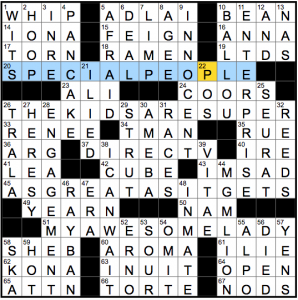
NYT puzzle 10.5.17 by Alan Arbesfeld
I’m not a huge fan of Wednesday themes masquerading as Thursday puzzles. I suspect this one was bumped to Thursday because the base phrases won’t all be familiar to many solvers, and possibly because it’s 72 words, which is necessarily going to strain the fill.
I should probably get around to explaining what’s going on here, huh… Alan has given us four “uplifting remakes” by taking movies containing a word meaning “meh” and replaced that word with one meaning “excellent.” Like so:
- 20a, SPECIAL PEOPLE [Uplifting remake of a 1980 Donald Sutherland/Mary Tyler Moore film?]. The original is Ordinary People.
- 26a, THE KIDS ARE SUPER [Uplifting remake of a 2010 Annette Bening/Julianne Moore film?]. The Kids are All Right.
- 45a, AS GREAT AS IT GETS [Uplifting remake of a 1997 Jack Nicholson/Helen Hunt film?]. As Good as It Gets.
- 51a, MY AWESOME LADY [Uplifting remake of a 1964 Audrey Hepburn/Rex Harrison film?]. My Fair Lady.
Ironically, I felt that this theme was ordinary/all right/good/fair. The puzzle is made artificially difficult by the fact that there’s no way to guess what the new adjective will be, which isn’t so much a problem as it is a bit of a slog. I got a legitimate chuckle out of THE KIDS ARE SUPER, so that’s something. It’s weird that in three cases the original adjective refers to goodness (ordinary, all right, good), while in one case the original adjective refers to beauty (fair).
I liked 10d, BALLOU [Cat played by Jane Fonda]. I noticed ILIE and I LIED in the same puzzle; I think there was some discussion here recently about what the longest shared string ought to be in two entries, though for me the test is whether they’re etymologically related. Clearly these aren’t, but it was still a little strange to see them both. 44d, MGM LION [Iconic movie studio symbol], looks cool in the grid. 38d, I CAN WAIT [“No rush”], is a nice debut.
I’m struggling to say anything else positive about this puzzle. There was a lot of stuff like SHEB, ILIE, ERNO, AMEBA, IONA, T-MAN, ARG, LEA, AGEE, VITAE, YENS, TRA LA(!), POS, LTDS — all of which detracted from the solve (which I didn’t love to begin with), and some of which seemed avoidable. One thing I liked was the I’M SAD clue [ :-( ], until I realized that the only other time I’M SAD was in the NYT (2014, Alex Vratsanos), it had the exact same clue!
I dunno. Other than the inclusion of The Kids are All Right (2010), ANNA Gunn, and an emoticon, this felt very fusty.
2.5 stars. Until next week!
Julian Thorne’s Wall Street Journal crossword, “Suggestion Boxes” — Jim’s review
Very nice rebus puzzle today. We don’t see these very often in the WSJ, so it’s always a nice surprise to find one.
But until you realize what’s going on, the puzzle might seem like a slog; at least it was for me. Once I caught on with the last theme entry, it all fell together beautifully. (Note the online app doesn’t allow rebus entries, so the image below just has H’s where the HINTs should be.)
(Oh by the way, I was thrown off by the title since last Saturday’s variety puzzle by Patrick Berry was also called “Suggestion Boxes.” It is, of course, outstanding. If you haven’t done it yet, what are you waiting for?)
- 17a [Proverbial preventative measure] A STITC(H IN T)IME / 18d [Back of beyond] (HINT)ERLAND. I wanted “An apple a day,” but that didn’t work. To be honest, I never knew what “A stitch in time saves nine” meant. The internets tell me it means, “An action taken now will prevent problems later.” HINTERLAND comes to us from the German.
- 22a [Miserly] C(HINT)ZY / 10d [Constitutional] WIT(HIN T)HE LAW
- 47a [“Rumble Fish” writer] S.E. (HINT)ON / 34d [Shark’s charge] HIG(H INT)EREST. Susan Eloise Hinton also wrote The Outsiders (while in high school).
- 64a [One-hit wonder, e.g.] FLAS(H IN T)HE PAN / 61d [Ise Grand Shrine worship] S(HINT)O. Great entries.
A lovely theme that put up just enough resistance and then fell into place once the light bulb came on. Excellent choice of theme answers.
And there’s still room for fun fill like SPECTRE, RED CENT, NEMESES, RUNNETH, and CANNERY. LOSES TO and TAKE TO aren’t great, but they’re not awful either.
Your million dollar vocabulary word of the day is 26d ECDYSIS clued as [Shedding of a skin]. I tried MOLTING at first because it fit, but I’m always happy to learn a new word. ECDYSIS also refers to the shedding of an exoskeleton in insects and other arthropods.
Clues of note:
- 45a [Iris Murdoch and Barbara Cartland]. DAMES. No, this clue wasn’t written in the 1930s. Both women were titled British authors. Dame Iris was 12th on a “50 greatest British writers since 1945” list. And Dame Barbara wrote a whopping 723 novels, mostly romances. This brings to three the number of women novelists featured in this puzzle.
- 20a [One might force you to retire]. FLAT. I was thinking FLAP (as in a scandal). But I wasn’t expecting such a tricksy clue. Shouldn’t that be “re-tire” or have a question mark?
- 27a [Cause of some shaking]. DEAL. I was married to FEAR as an answer here for much too long.
A terrific puzzle today and a great way to finish up the regular WSJ puzzle week.
Brendan Emmett Quigley’s website crossword – “Pot Holders” — Ben’s Review
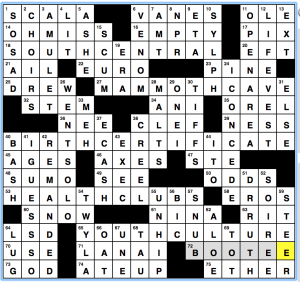 Happy Thursday, all! I am a giant square who didn’t immediately get the theme because my brain saw “pot holders” and immediately thought cooking. Here’s the theme clues from this week’s BEQ Thursday:
Happy Thursday, all! I am a giant square who didn’t immediately get the theme because my brain saw “pot holders” and immediately thought cooking. Here’s the theme clues from this week’s BEQ Thursday:
- 18A: Region where Watts is, commonly — SOUTH CENTRAL
- 27A:Kentucky tourist spot — MAMMOTH CAVE
- 40A:One might be needed to get a passport — BIRTH CERTIFICATE
- 53A: Places to work out — HEALTH CLUBS
- 65A: Teens’ lifestyles — YOUTH CULTURE
So I was expecting SAUTE or SAUCE or STEW to be in there somewhere, and I’m way overthinking it. Each of these contains THC. Watts is in SOUTH CENTRAL Los Angeles.
Other miscellaneous notes on this one:
- Didn’t love “OH, MISS” as a piece of fill
- The “First name in feminist folk-rock” would be that of ANI DiFranco
- I disagree with the spelling of BOOTEE (“Knitted baby shoe”). It’s BOOTIE.
- Mojos and jujus are both types of AMULET
- DR RUTH is awesome
3.75/5 stars
Ed Sessa’s LAT write-up – GRAB’s review
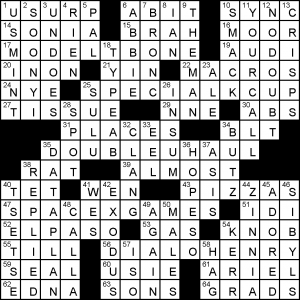
LA Times 051017
Two phrases – one ending with a letter, the other beginning with same – are smooshed together in today’s theme by Ed Sessa. The result is made up phrases which are clued suitably. We start off with MODEL(T)BONE, and SPECIAL(K)CUP (I have no idea what Keurig or a KCUP is, but Google suggests something like Nespresso, which I have the vaguest idea about, as it is marketed to the gills; KCUP alone has never appeared in a puzzle that I can see, which is curious.) DOUBLE(U)HAUL, SPACE(X)GAMES (Please don’t give Mr. Musk ideas) and DIAL(O)HENRY round off the set.
Remarks:
-
- [Harmless cyst], WEN. It crosses WES. Not a common word, and quite medical, yet also completely gratuitous. Y would be the best alternative, but DHL and M could all work…
- USIE. No stop it, crosswords.
- YOURCALL/NODOUBT is a pretty pair to run next to each other…
- DATAPLAN is also interesting as an answer that I haven’t seen before in a puzzle…
3.5 Stars
Gareth
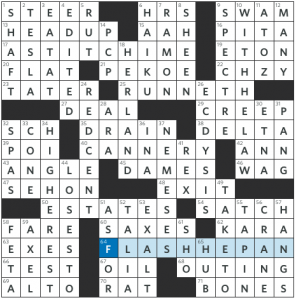

Not a hard Thursday even though I didn’t know any of the films they were referring to.
Jim: “I didn’t know any of the films they were referring to.”
Andy: “… the base phrases won’t all be familiar to many solvers…”
Really?
Wow.
Yes, really.
I don’t want to be misunderstood: “the base phrases won’t all be familiar to many solvers” doesn’t mean “many solvers won’t know *any” of the base phrases.” It means “many solvers won’t know all four base phrases.” I also don’t want to be misunderstood in a different way: these titles are all absolutely worth knowing. They’re famous films, they all won or were nominated for Oscars, and they’re all critically acclaimed.
My suspicion is that most solvers will probably know at least three of the titles. I’ve heard of all of these films and have seen three of them, but I’ve worked as a trivia writer for 10+ years. I think nearly every NYT solver has heard of “My Fair Lady,” and only slightly fewer than that know about “As Good As It Gets.” On the other hand, I think the Venn diagram between “solvers who are familiar with 1980 Best Picture winner Ordinary People” and “solvers who are familiar with 2010 Sundance darling The Kids Are All Right” has plenty of non-overlap. The huge generational gap among NYT solvers means plenty of older solvers haven’t been to the movies since 1997, while plenty of younger solvers have never seen a Robert Redford film.
I should revise one of the claims I made in my review: Will certainly deemed it fair to expect NYT solvers to be familiar with all four of these titles, or else he wouldn’t have run the puzzle. But he’s rejected plenty of themes for relying too heavily on “trivia” or “arcana” — e.g., wordplay/puns using song titles, movie titles, etc. — because they’re not accessible to the average solver. I still think that running this Wednesday-ish wordplay theme on a Thursday represents a concession, due in large part to Will’s hesitance to believe that NYT solvers are conversant in “trivia” like film titles.
Of course a lot of us not familiar with the film are humming this to ourselves…
The Who are alright and don’t care how it’s spelt.
Knowing the 1960s song and not the 2010 movie is ruining the whole generational argument. So be it.
I plead guilty to having big, gaping holes in my own knowledge of culture and pop culture. E.g, if I told you everything I knew about today’s TV stars, it would be a short conversation. (TV from my school days I know better.) I just take it as a given that average folk know a lot more about them than I do.
I’m not a good judge about what the average person/solver knows about movies. But I’m surprised when Best Picture winners and nominees are considered unknown. I’m not arguing what people should know or shouldn’t know, just saying I’m surprised.
The huge generational gap among NYT solvers means plenty of older solvers haven’t been to the movies since 1997, while plenty of younger solvers have never seen a Robert Redford film.
I understand the assumption behind that, but I think it paints with too broad a brush. There is a huge older movie-going audience. I’m often enough in near-full theaters where a guy like me in his 50s can feel young. It’s a very loyal, knowledgeable audience. (It’s the middle-aged years that makes movie-going a challenge, especially if you’re raising a family and working full-time.) I’m also surprised if younger audiences haven’t seen a Robert Redford film. Humphrey Bogart, Cary Grant, Jimmy Stewart et al. were all before my time, but I think most folks in my generation saw plenty of their movies. It’s easier now to see a Redford film than it ever was. So why younger solvers would have seen none I don’t quite understand.
Man, that theme… what?
It doesn’t hold together at all. “Ordinary”, “all right”, and “fair” are roughly synonyms, but then “good” is an outlier. But also “fair” in the context of the film title clearly means “beautiful”, NOT “fair” as in “mediocre.” But none of the other themers involve a double meaning.
Days like this I think of all the puzzles I’ve had rejected from the NYT because the theme was “inconsistent” or “not exciting enough” and I shake my head.
NYT: PANCAKE is a verb?
From online dictionary:
pancake |ˈpanˌkāk|
noun
a thin, flat cake of batter, usually fried and turned in a pan. Pancakes are usually eaten with syrup or rolled up with a filling.
• (also pancake makeup)makeup consisting of a flat solid layer of compressed powder, widely used in the theater.
verb
1 with reference to an aircraft) make or cause to make a pancake landing. [ with obj. ] he pancaked it in about twenty meters.
2 informal flatten or become flattened: [ no obj. ] : the hotel had pancaked into a heap of concrete.
PHRASES
(as) flat as a pancake completely flat.
ORIGIN late Middle English: from pan1 + cake.
WSJ: I got tripped up by the “a” in front of “stitch in time” – seems to me articles (a/an/the) aren’t usually included.
Is “whip” a blender setting?
It is on mine. #5 (of 12).
Is naenae #6?
Famous but possibly apocryphal story is that Gypsy Rose Lee asked HL Mencken for a fancy-word alternative to ‘stripper’ and that was how he came to coin ecdysiast.
Um, eww, I think.
NYT: My favorite moment during the solve was when I had an adjective starting with A and ending in E and I came up with MY AVERAGE LADY.
FB: Thanks, Jenni, for the Sendak shout-out and especially the Carole King song. My sister and I had that on vinyl as kids, and we played it to death.
LAT – I’ve barbecued a lot of things. Pork ribs, pork butt, beef brisket, and much more. I’ve never barbecued a T-Bone steak. I’ve grilled many but never barbecued one. Barbecuing is a low and slow technique while grilling is hotter and quicker.
As a dedicated meathead, I hear you. However, our use of the term is more specialized than common usage. In fact, ask Google to define it and the example offered is, “they barbecued some steaks.” Any dictionary will support the clue.
TOLERATOR was a trouble spot for me in the NYT, I tried MODERATOR and MEDIATOR first. And I thought the Fireball was pretty easy– except for the upper left, which took more time than the rest of the puzzle.
Maybe that’s because TOLERATOR was in the FB. (^~^)
I liked the NYT despite several above who evidently didn’t.
WSJ: Saxes are not part of the horn section. They belong to the winds section.
I think it’s ok in jazz parlance, although barely.
SHAFT and the odd use of RETIRE made the NW of the WSJ hard for. In the SE, I still don’t follow TAPIN as “green gimme.”
TAP-IN, meaning an easy putt. A “gimme” on the golf green.
WSJ was the Thursday NYT we should have had.